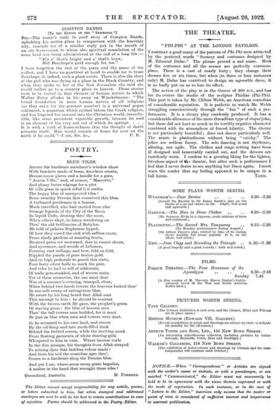COMPTON DANDO.
[To ISE EDITOR Or THE BrOGTATOR."3
Sia,—The rustic's reply in youi• story of Compton. Dando, upholding his native place in comparison with the heavenly city, reminds me of a similar reply put in the mouth of an old Scotewoman to whom also spiritual consolation of the same kind was being administered at the end of a. long life :— " It's a' that's bright and a' that's braw, But Bourhope's guid enough for me."
I have forgotten the rest of the poem and the name of the author, and I have no gazetteer at hand to enable me to trace Rourhope, if, indeed, such a place exists. There is also the story of the girl who was dying at a place in the Black Country, and when they spoke to her of the New Jerusalem she said she would rather go to a country place in heaven. These stories seem to be rooted in that element of human nature to which Walter Pater alludes in his essay on Winckelmann : "The broad foundation in mere human nature of all religions (as they exist for the greatest number) is a universal pagan sentiment, a paganism which existed before the Greek religion, and has lingered far onward into the Christian world, ineradic- able, like some persistent vegetable growth, because its seed is an element of the very soil out of which its springs. . . . It is with a rush of home-sickness that the thought of death presents itself. Man would remain at home for ever on the earth if he could."—I am, Sir, &c., P. R.


































 Previous page
Previous page